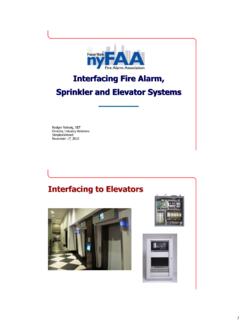Transcription of INTERNATIONAL ASSOCIATION OF FIRE FIGHTERS
1 INTERNATIONAL ASSOCIATION OF fire FIGHTERS EDWARD A. KELLYFRANK V. L MA General PresidentGeneral Secretary-Treasurer1750 NEW YORK AVENUE, , WASHINGTON, 20006-5395 (202) 737-8484 FAX (202) 737-8418 2022 Dear Member of Congress:On behalf of the more than 326,000 men and women of the INTERNATIONAL ASSOCIATION of fire FIGHTERS (IAFF), I present a copy of our 2022 Legislative Issues Book. This briefing book will provide you with a better understanding of the policy issues that impact America s professional fire FIGHTERS and emergency medical personnel. Our members face significant challenges at the federal, state and local levels, particularly as they continue to serve their communities in the wake of COVID-19.
2 The decisions you make on Capitol Hill directly impact their ability to do their jobs safely and of IAFF leaders and members will gather in our Nation s Capital March 6-9, 2022, to meet with their elected representatives. I hope that you find the time to meet with your fire fighter and emergency medical personnel constituents to hear their concerns and discuss the issues outlined in these you for your consideration of our views and issues. Please know that our entire office stands ready to assist you and your staff throughout the year. Please do not hesitate to call on us. We look forward to working with ,Edward A.
3 KellyGeneral PresidentIAFF Legislative Issues Book 117th Congress Second SessionFire Fighter and EMS Collective Bargaining RightsFact Sheet 4 Key Points 5 Early Retiree Health Care for Public Safety WorkersFact Sheet 6 Key Points 7 Federal fire Fighter Presumptive DisabilityFact Sheet 8 Key Points 94 fire FIGHTER AND EMS COLLECTIVE BARGAINING RIGHTS | FACT SHEETBACKGROUNDLEGISLATIONFire Fighter and EMS Collective Bargaining RightsThe IAFF strongly supports the fire FIGHTERS and EMS Employer-Employee Cooperation Act and encourages members of Congress to cosponsor the and EMS departments benefit from productive partnerships between employers and employees.
4 Studies have shown that communities with strong labor-management relations enjoy more effective and efficient delivery of emergency services. Recently, this cooperation enabled employers and workers to confront budgetary constraints, staffing challenges and shortages of personal protective equipment (PPE) amid the coronavirus pandemic. The best way to promote this cooperation is through an established collective bargaining framework. Legislation providing these rights to fire FIGHTERS and EMS personnel has long received strong bipartisan support in Congress due to its key role in establishing better staffed, equipped and trained fire has extended collective bargaining laws to private sector employees, transportation workers and federal government employees.
5 One of the few groups of workers not covered by federal law are state and local government employees including fire and EMS personnel. Ensuring fire and EMS personnel have basic collective bargaining rights is consistent with the increasing role of fire FIGHTERS and EMS personnel in protecting our national security and responding to emergencies across state lines. Local and state governments would still maintain control over their own policies as the legislation would not interfere with right-to-work laws or existing labor agreements. In fact, many states would not need to make any fire FIGHTERS and EMS Employer-Employee Cooperation Act would give fire and EMS personnel basic collective bargaining rights in states that currently do not provide them and protect these rights in states where they exist but could be repealed.
6 The legislation gives states wide flexibility to develop their own laws based on the following minimum standards: The right to form and join a labor organization and to have that organization recognized through a written contract. The right to bargain over working conditions, hours and wages. The ability to resolve disputes through an impasse resolution mechanism and, when an agreement is reached, the right to enforce the legislation does not permit strikes and lockouts by fire FIGHTERS and EMS : 2586, the fire FIGHTERS and EMS Employer-Employee Cooperation Act of 2021 Sponsors: Representative Dan Kildee (D-MI); Representative Brian Fitzpatrick (R-PA)Senate: S.
7 2178, the fire FIGHTERS and EMS Employer-Employee Cooperation Act of 2021 Sponsor: Senator John Hickenlooper (D-CO)Summary: The Cooperation Act would guarantee fire FIGHTERS and emergency medical services personnel basic collective bargaining rights in states that do not currently provide POINTSFIRE FIGHTER AND EMS COLLECTIVE BARGAINING RIGHTS | KEY POINTSThe Cooperation Act enjoys broad bipartisan support while protecting states rights Legislation providing collective bargaining rights for fire FIGHTERS and EMS personnel has enjoyed broad, bipartisan support in Congress. The House of Representatives passed legislation in the 110th Congress by a vote of 314 to 97 with a majority of each party in favor.
8 The bill gives maximum flexibility for states to craft their own laws and enables fire FIGHTERS and EMS personnel to sit down and talk with their employers. The Cooperation Act respects the uniqueness of each state s employment needs by prohibiting fire FIGHTERS or EMS personnel from striking, maintaining states right-to-work laws and enabling local jurisdictions to make public safety bargaining helps protect public safety The federal government has a vested interest in improving local emergency response capabilities by supporting adequate staffing, training, and equipment. Beyond local emergencies, preparedness for major interstate emergency incidents, such as natural disasters and terrorist acts, relies on effective local fire and EMS agencies.
9 This readiness is best supported when first responders can work directly with their local government leadership to ensure their needs are met. fire FIGHTERS ability to talk about their job with employers protects public safety and promotes preparedness. Collective bargaining has produced measurable improvements to staffing, training, equipment and health and safety throughout the nation s fire departments. The benefits from this improved coordination are illustrated by the fact that civilian fire fatality rates are, on average, lower in states that provide these basic rights to fire and EMS personnel. The Cooperation Act is a matter of fairness for public safety fire FIGHTERS and emergency medical personnel risk their lives every day to protect the public.
10 They deserve the same rights to discuss workplace issues with their employer that the federal government grants most other workers. The United States has a long history of providing collective bargaining rights to workers. The freedom to assemble is established by the First Amendment to the Constitution and is key to our democracy. These rights were further codified over 80 years ago for private sector workers through passage of the National Labor Relations Act. Those working on the frontlines to protect our communities must be treated the Cooperation Act strengthens public safety retirement and wages Due to the dangerous nature of the profession, fire FIGHTERS often are forced to retire early, putting an emphasis on smart retirement planning.












